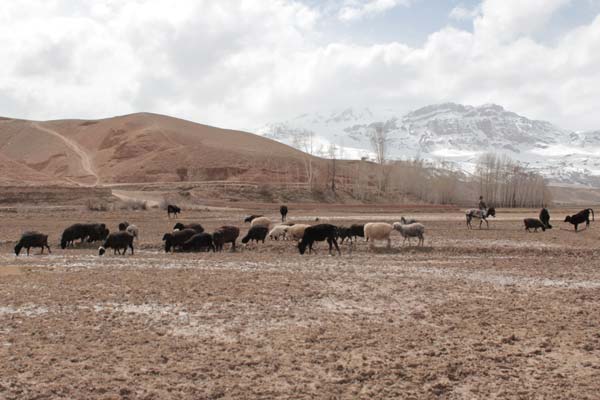Shahrbanoo 'Shahr' Sadat is reinventing Afghan cinema with her new arthouse film, ‘Wolf And Sheep’.
A 24-year-old writer, producer and director who is based in Kabul, Shahrbanoo’s film tells the story of daily life for families – particularly children – living in rural, sheep-herding communities where she grew up.
‘Wolf And Sheep’ will be the first-ever, arthouse film to be directed by a woman in Afghanistan. The cast includes 800 local children who were selected from surrounding villages. The film is scheduled to start shooting in May 2015.
Can you tell us about the premise behind ‘Wolf And Sheep’?
‘Wolf And Sheep’ is about daily life in a valley somewhere in rural, central Afghanistan where children have to take care of the sheep and goats and bring them up to the mountains to graze every day. We focus on this community through one of the little shepherds, Basira who is 11 and almost blind; nobody knows about her problem, not even Basira herself. ‘Wolf And Sheep’ is about the routing life of its inhabitants. It is about what your allowed to do and what isn’t allowed. The film is about the very small details in this community, their traditions, values and beliefs.
Why did you feel it was important to tell this story?
I was born in Iran during the immigration period; after 9/11 we moved back to Afghanistan, to my parents village, a remote village somewhere in rural, central Afghanistan. I felt like an outsider because I spoke with an Iranian accent. A week before we moved to Afghanistan I realised I had a vision problem. I got a pair of glasses but I couldn’t use them for seven years because the village people believed only blind people used glasses – I never wanted to make myself even more of an outsider by using my glasses.
After I moved to Kabul, seven years later, I met a guy who became my best friend, we realised we lived in the same community but at a different time. I lived there between 2001-2008 and he lived there between 1972-1980. He gave me his 800-page diary and I was totally shock to read it; there had been no change in the village and people and their beliefs. It looks like time has stopped in that village. I thought what if I mix these two experiences together and make them at the same time. Then I decided to make a film about nothing really specific or really dramatic, but only about routine and through routine we have the opportunity to take a look at real Afghanistan, how they look at life.
 Are you aware of other Afghan cinema that has been released in the west? How would you say that ‘Wolf And Sheep’ differs from previous Afghan releases?
Are you aware of other Afghan cinema that has been released in the west? How would you say that ‘Wolf And Sheep’ differs from previous Afghan releases?Afghan and international cinema always tries to show the dark sides of Afghanistan and sometimes bright side of Afghanistan. I talk about Afghanistan that is not supposed to be talk about: Taliban, war and woman rights. ‘Wolf And Sheep’ is actually about nothing really specific, but about everything. I want to share my point of view based on my experiences there right in the location I want to shoot the film. I want to show you my Afghanistan where war is not the point at all.
How has the political situation in Afghanistan affected its output of cinema and the arts?
Nobody cares about culture and not about movies. Our politicians believe there are more important things than making films. That’s why Afghanistan has only produced two feature films since 2001. There is no funding and no support. There is no Afghan film institute to help filmmakers. I can understand making films is not easy anywhere, but it’s a nightmare in Afghanistan.
This is the first arthouse film in Afghanistan to be directed by a woman, why do you think that is?
Because making a film with no support from your country is a risk. Filmmakers prefer to focus on short films and TV documentaries and even commercials. It’s a big deal making films. I personally have worked on ‘Wolf And Sheep’ since 2010, but I need to do another job to pay the bills. So I have to work somewhere else ten hours per day and then when I get back home I need to work on my film projects. So I don’t have any personal life anymore because I need to only work and work. Otherwise I can’t make it! Afghan society is a traditional and religious society; as a female living in such a society it is not easy at all. You need to be brave and sometimes careless about what is happening around you. You need to pass the red lines every day and you need to really be sure about what you want to do because you risk your life.
Can you explain a little about what the money raised by the Pozible campaign will be used for?
We will use this money for security, insurance for equipment and crew – it costs a lot for a country like Afghanistan. We talked with one of the best, security companies in Denmark, so they will be with us during our eight weeks of shooting in rural, central Afghanistan.
– written by Nicholas Atkins


